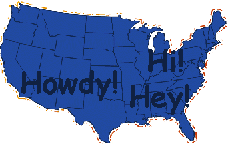Drop That Pasty, eh?

Q. What is the difference between dialect and jargon?
A. Dialect is usually associated with a geographic region. It involves features such as vowel sounds, diphthong values, speed of talking, clipped or unclipped words, sentence structure, and idiomatic vocabulary. Note that it's not too difficult for the average person to identify broadly where someone came from (California, Deep South, Maine, etc.). Aside from geography being a determiner, sometimes class is a factor. In that case, the technical term used is sociolect. When dialect leads to mutual unintelligibility, it is usually in its spoken form. Written out, common features are more apparent.
Jargon, rather than being limited to a specific region or class, is usually the property of particular professions, hobbies, pursuits, sects, and so on. Generally, a specialized vocabulary is the strongest feature of jargon. Speakers will retain their regional accents, but they will share a common technical vocabulary. When it is designed merely to exclude outsiders, jargon is justly subject to ridicule; when it is designed to allow professionals to communicate efficiently and accurately, it serves a useful purpose.
The word vernacular covers the everyday language spoken by a people as opposed to a more literary language; it is native or indigenous. But sometimes it is a synonym for dialect (the vernaculars of New York City) and sometimes a synonym for jargon (the legal vernacular).
Check out Mike's latest book here: http://arbutuspress.com/
or at Amazon.com
Visit the Senior Corner at http://seniors.tcnet.org
wordmallATaol.com
(substitute @ for AT above)
or at Amazon.com
Visit the Senior Corner at http://seniors.tcnet.org
wordmallATaol.com
(substitute @ for AT above)


Comments